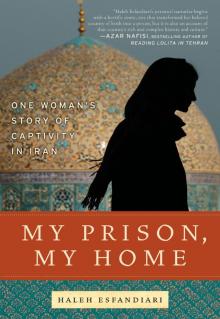My Prison, My Home: One Woman's Story of Captivity in Iran 

Genre: Other8
Published: 2010
View: 1904
Read OnlineRead My Prison, My Home: One Woman's Story of Captivity in Iran Storyline:
From Publishers WeeklyDecember 30, 2006, was the night Esfandiari's nightmare began. Traveling by car to the Tehran airport, following a visit with her elderly mother, the director of the Middle East Program at the Woodrow Wilson Center in Washington, D.C., was robbed. The 67-year-old felt lucky, not to have been injured in what she initially thought was a simple snatching of her belongings, including her passport. A few friends warned of more dire consequences. Esfandiari (_Reconstructed Lives: Women and Iran's Islamic Revolution_) did not realize that upon returning to her childhood home, she was entering a maelstrom, fueled by the long-standing animosity between Tehran and Washington—which contributed to her eight-month interrogation, four of which were spent in Evin Prison in solitary confinement. Most disconcerting was the shattering of Esfandiari's feelings for her native land: I felt the country I had cherished all my life was no longer mine. I had loved Iran with a passion.... Yet these horrible people had made me feel alien in my own homeland. In this engaging memoir, Esfandiari weaves together strands of her family and professional life, the problematic and complex history of American-Iranian relations, along with a reasoned eyewitness account of being held as a political prisoner. (Oct.) Copyright © Reed Business Information, a division of Reed Elsevier Inc. All rights reserved. Review“Esfandiari recounts in measured, at times chilling, detail her journey into the bowels of the Iranian intelligence apparatus. Neither the fear nor the fury that she undoubtedly felt compromise the clarity of her observations . . . there is an unmistakable and persistent dignity.” (New York Times Book Review ) “Episodes from Esfandiari’s harrowing experience are woven together with insights about the conspiracy-minded Iranian leaders and their difficult relationship with the United States.... Esfandiari’s book will help you understand both why Iranians are so hungry for change, and why its rulers are so afraid of Twitter. ” (Double X ) “[A] gripping memoir. . . . Esfandiari writes with an elegant dryness that serves the book well, since she hardly needs to sensationalize her story.” (Bloomberg.com ) “Esfandiari’s Kafkaesque tale of entrapment and imprisonment gives readers a shocking lesson in the horrors of Iran’s government. And her refusal to break under strict confinement and false charges . . . is inspiring and powerful.” (New York Post ) “A memoir of considerable delicacy and sophistication . . . a lucid, concise history of Iran through the twentieth century and into the first years of the twenty-first, and with it an outline of her own remarkable life.... [F]illed with vivid details and facts...powerful.” (Claire Messud, New York Review of Books ) “A powerful addition to the prisoner-as-pawn literature.... Framing this prison story is a well-wrought and poignant memoir: Esfandiari tells of her parents, the Iran of her youth, and her journalistic and scholarly career. Also included are perceptive pages on U.S.-Iranian relations.” (Foreign Affairs ) “[A] profoundly moving memoir . . . this is above all, a story of faith—in the human capacity to withstand mistreatment and in what people working together against tyranny can accomplish.” (Ms. Magazine ) “[Esfandiari] goes well beyond the headlines by deftly weaving personal narrative with a political history of modern Iran...” (Washington Post ) “[Esfandiari] weaves her personal experience with the political and historical background of Iran.... Best are the more personal descriptions: the white rose from a guard... the strength of her mother...how Esfandiari...attempt[s] to maintain some sense of dignity.” (Irish Times ) “Compelling....’My Prison, My Home’ goes well beyond the headlines by deftly weaving personal narrative with a political history of modern Iran.” (Denver Post ) “A masterful memoir...an intimate tale of bravery in the face of ignorance set against the larger tragedy of U.S.-Iran relations. Esfandiari’s story—timely, suspenseful and artfully told—will fascinate experts and general readers alike.” (Madeleine K. Albright, U.S. Secretary of State, 1997–2001 ) “Esfandiari weaves together strands of her family and professional life, the problematic and complex history of American-Iranian relations, along with a reasoned eyewitness account of being held as a political prisoner.” (Dailybeast.com ) “[Obama’s] bedside reading should be Haleh Esfandiari’s brilliant, shattering book ‘My Prison, My Home,’ in which the Wilson Center scholar recounts her own 2007 Evin nightmare.” (Roger Cohen, New York Times ) “This is an engaging book that will inform the reader and make it easier to understand the issues that define Iran in the 21st Century. ” (Rooftop Reviews ) “Gripping...[Esfandiari’s] book lays bare the paranoid mind-set of a regime convinced that any internal protest is part of a Western plot to organize a so-called “velvet revolution” like the mass revolts that brought down leaders of some former communist countries.” (Philadelphia Inquirer ) “A chilling rendition of the deep enmeshment of the personal and the political... how interlocked we all are in this world.... [A] finely wrought . . . a window on a terrible and terrifying world and the trial by fire that some... are forced to endure.” (Washington Times ) “Esfandiari’s account of her incarceration in Tehran, her perseverance and finally freedom has wider universal implications.... We need to return time and again to the question she so poignantly poses at the end of her account.: “I owe my freedom to those who took up my cause. What of others?’” (Azar Nafisi, author of Reading Lolita in Tehran )Pages of My Prison, My Home: One Woman's Story of Captivity in Iran :